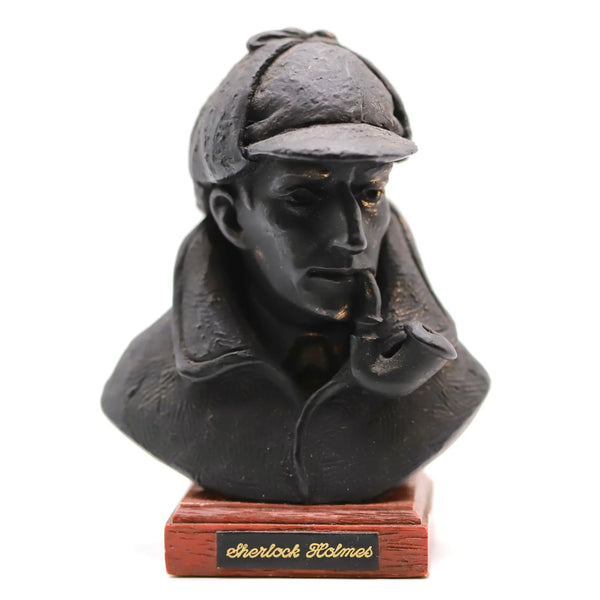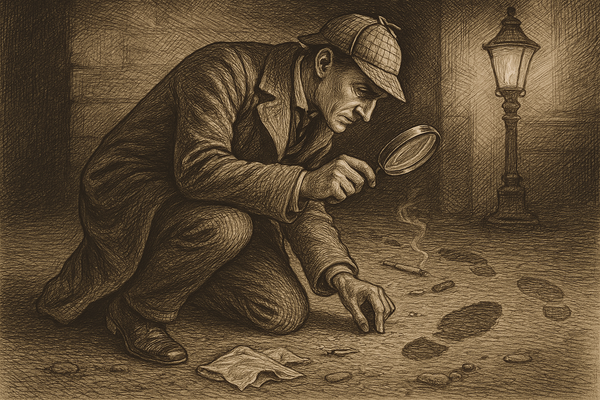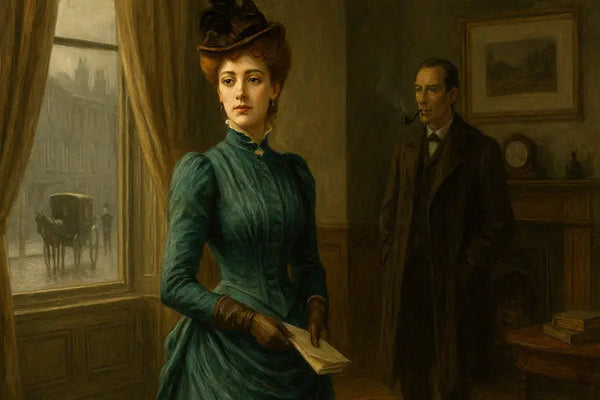In the world of crime-solving, there is perhaps no name more renowned than Sherlock Holmes. With his keen powers of observation, razor-sharp intellect, and uncanny ability to deduce the truth from the tiniest of clues, Holmes has become the epitome of a master detective. But how did he acquire such exceptional skills? This article delves into the art of deduction and explores how Holmes honed his abilities to solve even the most perplexing of crimes.
From the foggy streets of Victorian London to the opulent drawing rooms of the upper class, Holmes navigated the complex world of crime with unwavering determination. With his trusty companion, Dr. John Watson, by his side, he tackled seemingly unsolvable mysteries, relying on his astute observation and logical reasoning to crack the case.
Drawing on real-life inspirations and his own innovative methods, Holmes developed a scientific approach to crime-solving that revolutionized detective work. By carefully analyzing every detail, from footprints to fingerprints, he pieced together the puzzle to expose the truth that lay hidden beneath the surface.
Join us on a journey into the mind of Sherlock Holmes as we explore the fascinating world of deduction and unravel the secrets behind his extraordinary talent for solving crimes.
The Genius of Sherlock Holmes
Sherlock Holmes, the fictional detective created by Sir Arthur Conan Doyle, has captivated readers for over a century. With his exceptional intellect, Holmes was able to solve crimes that baffled Scotland Yard and left ordinary investigators scratching their heads. But what made Holmes a genius?
One of the key factors that set Holmes apart was his incredible attention to detail. He had a remarkable ability to observe even the most minute aspects of a crime scene, often noticing things that others would overlook. Whether it was a misplaced hair or a smudge on a windowpane, Holmes understood that every clue, no matter how seemingly insignificant, could hold the key to solving the mystery.
In addition to his acute observational skills, Holmes possessed a prodigious memory. He could recall vast amounts of information, ranging from obscure facts to the latest developments in scientific fields. This encyclopaedic knowledge allowed him to draw connections between seemingly unrelated pieces of evidence, leading him closer to the truth.
Furthermore, Holmes had a highly analytical mind. He approached every case with a logical and rational mindset, carefully considering all possibilities before arriving at a conclusion. This logical reasoning, combined with his sharp intuition, enabled him to see patterns and uncover hidden motives that others missed.
The Art of Deduction
At the core of Holmes' success as a detective was his mastery of the art of deduction. Deduction, in its simplest form, is the process of drawing logical conclusions based on evidence and reasoning. Holmes elevated this practice to an art form, employing a systematic approach that allowed him to unravel the most complex of mysteries.
Holmes' deductive reasoning relied on two fundamental principles: observation and inference. He believed that by carefully observing the facts of a case, one could infer the truth behind them. This process involved making logical connections between various pieces of evidence, allowing Holmes to construct a coherent narrative of events.
To facilitate his deductive process, Holmes developed a set of techniques and methods that he employed in his investigations. One such technique was the "deductive syllogism," a form of logical reasoning in which two premises lead to a conclusive statement. By applying this method, Holmes could eliminate improbable scenarios and narrow down the possibilities to the most likely solution.
Another technique that Holmes frequently employed was the "abductive reasoning." This form of inference involved making the best possible explanation for a given set of observations. Holmes would gather all the available evidence and generate hypotheses, selecting the one that best accounted for the facts at hand.
Sherlock Holmes' Methods and Techniques
Sherlock Holmes' methods and techniques were as diverse as the cases he encountered. From analysing footprints to examining handwriting, Holmes utilised a range of investigative tools to uncover the truth. One of his most famous techniques was his keen eye for detail.
Holmes understood that the smallest details could provide valuable insights into a crime. For example, a smudge of dirt on a suspect's shoe could indicate their recent whereabouts, while a thread snagged on a fence could reveal their escape route. By carefully examining every aspect of a crime scene, Holmes could piece together a comprehensive picture of events.
In addition to his observational skills, Holmes also made use of forensic techniques that were ahead of his time. He was a pioneer in the field of fingerprint analysis, recognising the unique patterns and ridges that could be used to identify individuals. Holmes also utilised chemical tests to detect the presence of poisons and other substances, further aiding his investigations.
Furthermore, Holmes was a master of disguise. He often adopted different personas to gather information or infiltrate criminal organisations. By blending into his surroundings, Holmes was able to observe without attracting suspicion, allowing him to gather vital clues that would otherwise remain hidden.
The Science of Crime Solving
Sherlock Holmes' approach to crime-solving can be seen as a precursor to modern forensic science. Although his methods may seem rudimentary compared to today's technology, Holmes laid the foundation for many of the techniques used in criminal investigations.
One of Holmes' most significant contributions to the science of crime solving was his emphasis on the scientific method. He believed that investigations should be approached with a scientific mindset, relying on empirical evidence rather than conjecture. This approach, coupled with his meticulous attention to detail, allowed Holmes to gather and analyse evidence in a systematic and objective manner.
Additionally, Holmes recognised the importance of collaboration and interdisciplinary expertise in solving complex cases. He often sought the assistance of experts in fields such as chemistry, botany, and geology, recognising that their specialised knowledge could provide valuable insights.
Baker Street and the World of Sherlock Holmes Baker Street, the fictional address of Sherlock Holmes' residence, has become synonymous with the world of the famous detective. Located in the heart of Victorian London, Baker Street served as the backdrop for many of Holmes' adventures.
The description of Holmes' residence at 221B Baker Street has become iconic, with its study filled with books, chemical apparatus, and scientific instruments. This setting not only provided a sense of atmosphere but also reflected Holmes' character as a man of intellect and curiosity.
Baker Street itself was a microcosm of Victorian society, with its mix of social classes and diverse characters. From the bustling streets to the quiet alleys, Holmes navigated this world with ease, using his powers of observation to uncover the truth hidden beneath the surface.
Sherlock Holmes in Literature
Sherlock Holmes made his debut in the novel "A Study in Scarlet" and quickly became a literary sensation. His popularity led to the creation of numerous short stories and novels featuring the detective and his trusty companion, Dr. John Watson.
Sir Arthur Conan Doyle's writing style, characterised by intricate plots and attention to detail, brought Holmes' world to life. Readers were captivated by the detective's deductive prowess and his ability to solve even the most baffling of mysteries.
The stories featuring Sherlock Holmes are renowned for their complex and engaging narratives. Each case presented a unique challenge for Holmes to unravel, often showcasing his exceptional abilities and his unyielding pursuit of justice.
Sherlock Holmes in Film and Television Adaptations Sherlock Holmes' popularity extended beyond the pages of literature, with numerous film and television adaptations bringing the detective to life on-screen. The first known adaptation of Holmes was a silent film released in 1900, titled "Sherlock Holmes Baffled."
Since then, Holmes has been portrayed by a multitude of actors, each bringing their own interpretation to the character. Notable portrayals include Basil Rathbone's iconic performance in the 1930s and 1940s, Jeremy Brett's highly regarded portrayal in the 1980s and 1990s, and more recent adaptations by Robert Downey Jr. and Benedict Cumberbatch.
These adaptations have introduced Holmes to new generations of fans, showcasing his enduring appeal and the timeless nature of his stories. Whether set in the original Victorian era or in modern times, the essence of Holmes as a brilliant detective remains intact.
Sherlock Holmes' Influence on Popular Culture
Sherlock Holmes' impact on popular culture cannot be overstated. His character has permeated all forms of media, from books and films to video games and television shows. The detective's image has become instantly recognizable, with his deerstalker hat, magnifying glass, and pipe serving as symbols of his detective prowess.
Holmes' influence extends beyond his iconic appearance. His methods of deduction and logical reasoning have inspired countless real-life detectives and criminal investigators. The principles he employed, such as careful observation and meticulous analysis, continue to shape the field of forensic science today.
Furthermore, Holmes' enduring popularity has spawned fan communities, known as "Sherlockians," who gather to discuss and celebrate the detective's adventures. These communities have kept the spirit of Holmes alive, ensuring that his legacy continues to resonate with new generations.
Conclusion
The Enduring Legacy of Sherlock Holmes Sherlock Holmes' brilliance as a detective and his unique approach to crime-solving have solidified his place in literary history. From his keen powers of observation to his logical reasoning, Holmes embodied the essence of a master detective.
Through his adventures in literature and adaptations on-screen, Holmes has captivated audiences for over a century. His enduring legacy can be seen in the continued popularity of his stories and the lasting impact he has had on the field of crime-solving.
As we unravel the secrets behind Holmes' extraordinary talent, we gain a deeper appreciation for the art of deduction and the genius of a character who continues to inspire and intrigue us.
















































